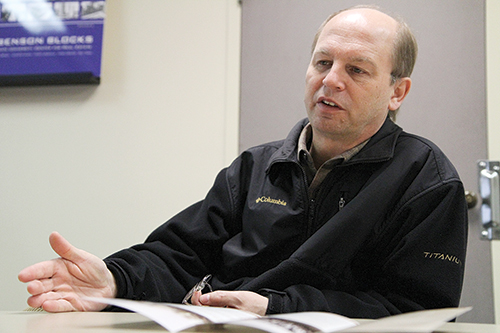Studying real estate in this economy may sound insane. But Portland State Center for Real Estate Director Dr. Gerard Mildner thinks that moment has passed. “The United States is coming out of a major recession, and many people have left the real estate industry, creating a lot of openings,” Mildner said.
PSU offers new real estate master’s

Studying real estate in this economy may sound insane. But Portland State Center for Real Estate Director Dr. Gerard Mildner thinks that moment has passed.
“The United States is coming out of a major recession, and many people have left the real estate industry, creating a lot of openings,” Mildner said.
September marked the beginning of the first year of the center’s Master of Real Estate Development program. The program is geared toward working professionals and aims to give graduates the tools they need to succeed in today’s commercial real estate environment.
The MRED program focuses on three aspects of the commercial real estate industry: development, finance and sustainability.
While a career in residential real estate does not require any further education than a certificate or bachelor’s degree, a career in commercial real estate, which deals with larger buildings such as condos or offices, is difficult to achieve without the specialized education provided by the MRED program.
“Real estate is one of those industries that can benefit from more professionals,” said Matthew Larrabee, a professor of real estate evaluation at PSU and the principal appraiser and president of Real Estate Services Group Inc.
Most classes in the MRED program are taught by adjunct professors who also work in the real estate industry. The program, designed to be completed in two years on a full-time schedule and three years on a part-time schedule, offers classes only in the evenings.
Mildner said the process of establishing a new graduate program was long and difficult.
Because the center is a joint program between the School of Business Administration and the Nohad A. Toulan School of Urban Studies and Planning, there were twice the amount of concerns, compromises and worries to be discussed by department committees, university committees and other staff, Mildner said.
The top priority in the process was budgeting. “We can’t stretch our resources [too far],” he said. Other concerns included facilities and student services.
But this last fall, after much fuss and debate, the first cohort of 15 students began the MRED program.
“They were fantastic. They were all smart, inquisitive and excited to succeed in this business,” said Julie Gibson, assistant director of the center. “We couldn’t be more pleased.
“The students we attracted are also reflective of the program and what we offer. We are attracting the right kind of students,” she added.
The center’s faculty has also been meeting with students of the program in order to check in and receive feedback. Of the 15 students, four have already met with faculty, and according to Gibson the overall responses have been very positive.
“Students find the access to the real estate industry the most valuable aspect of the program,” she said.
The focus of the MRED program is as much about what is being taught in the classroom as what is being gained outside.
MRED students have available to them a number of opportunities to experience real work in the commercial real estate industry and to build a valuable network.
One route to gaining insight, Gibson explained, is through an invite-only group of highly respected industry leaders. The advisory board will host five to six mentors a year and offers three lunchtime meetings to provide insight and advice on potential career paths.
“Real estate students can also be set up with a one-on-one meeting with industry folks for career advice, planning, networking or to look over a resume,” Gibson said.
Gibson said she will also personally work with students to find internships in their field of choice. “We link them to the right people in the hiring management of the industry,” she said.






